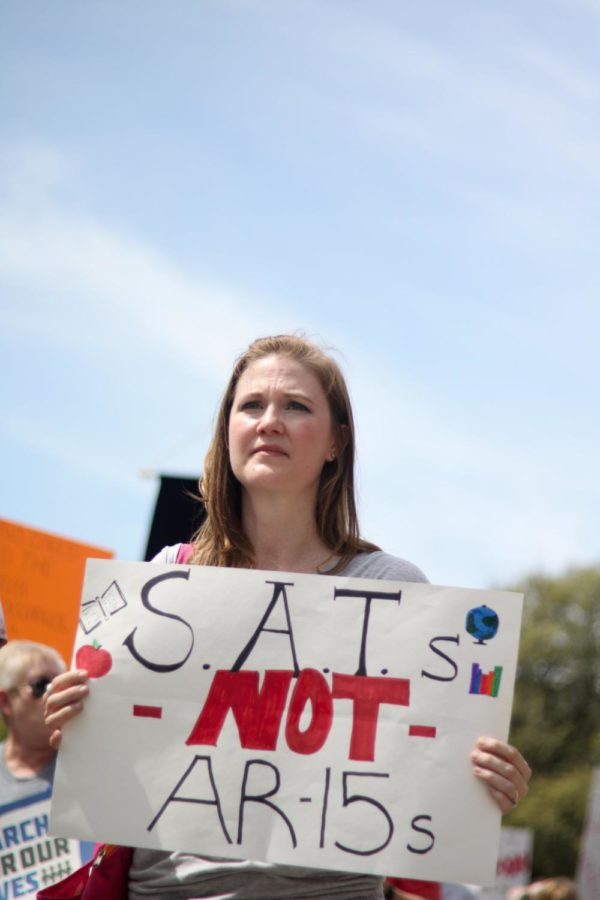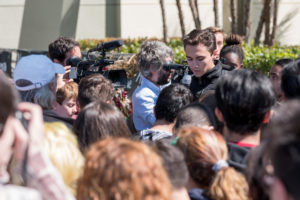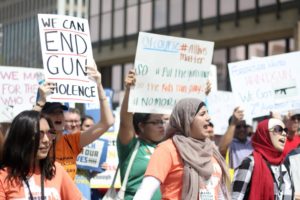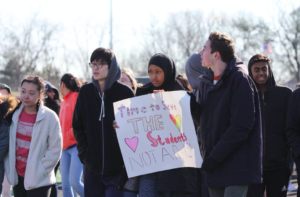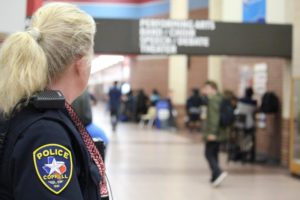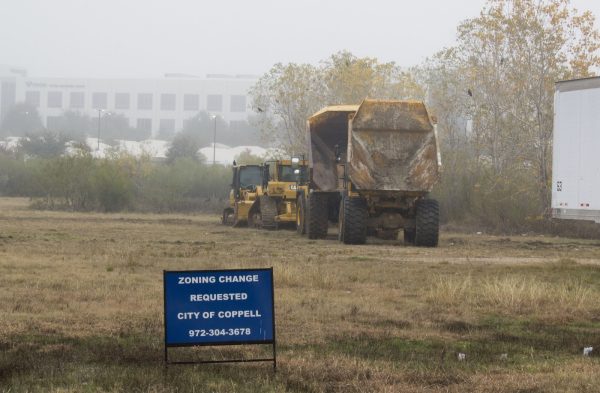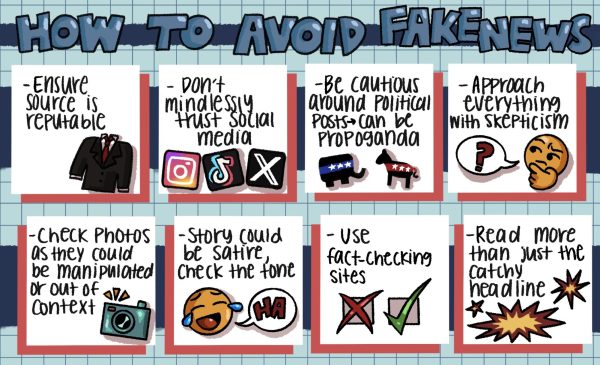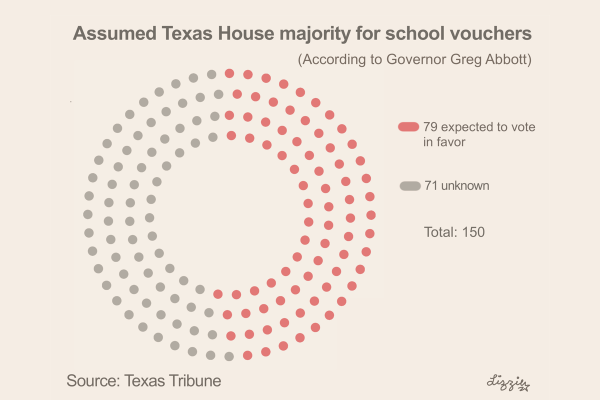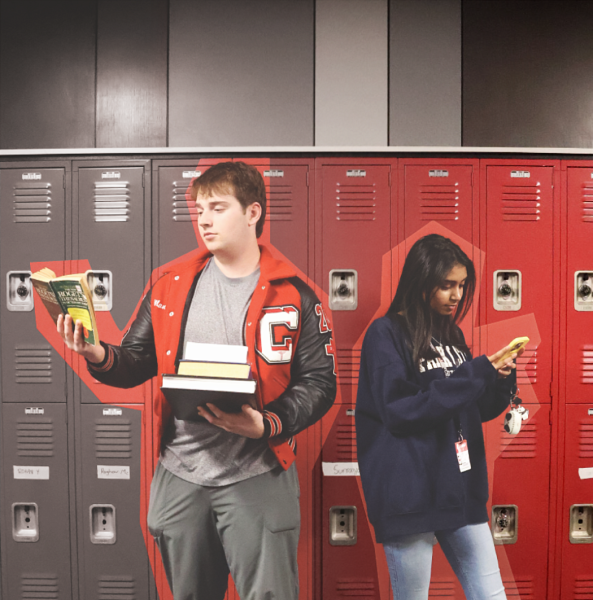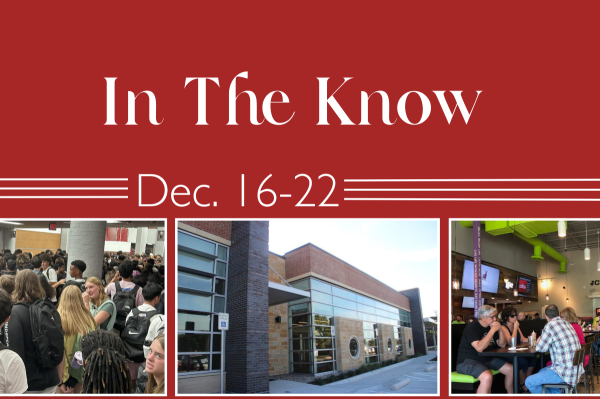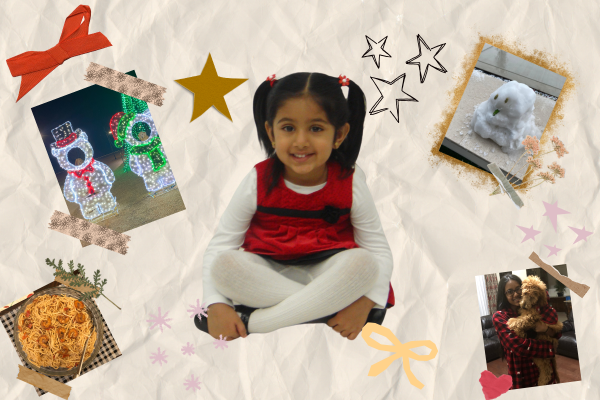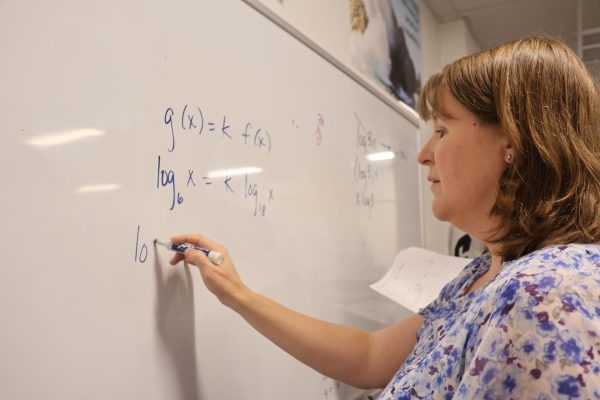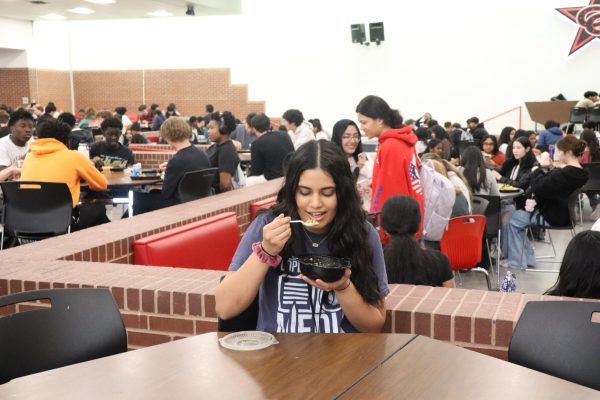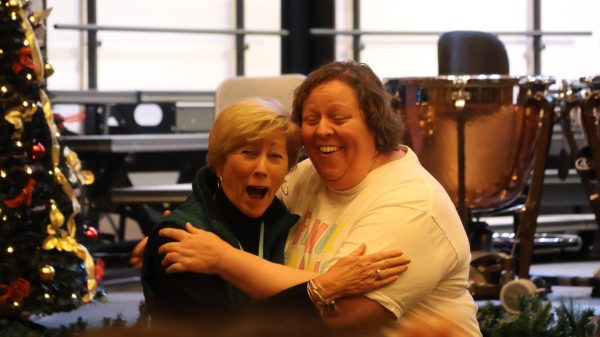This is what democracy looks like
From Twitter to town halls, students born post-Columbine in America rise up for their mortality
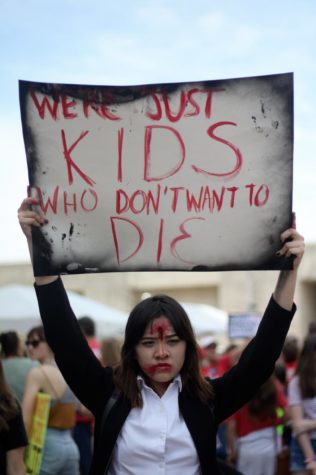
Mansfield Timberview High School junior Jac Nguyen raises her poster at March for Our Lives in downtown Dallas on March 24. The march was attended by approximately 7,000 demonstrators in support of gun control and school safety.
March for Our Lives gives teens a chance to speak up
DALLAS – With a painted bullet in her head and a painted sign in her hand, Mansfield Timberview High School junior Jac Nguyen took to the streets of Dallas.
Nguyen’s statement stood out among the signs at March for Our Lives on March 24, but it was by no means alone in its intent.
“We are kids that were born in a post-Columbine era; they are the adults who didn’t have to fear what we fear today,” Nguyen said.
March for Our Lives is driven by youth in America. With many of the marches chapters and the parent march itself being organized by teens, March for Our Lives is filled with youthful energy.
“Our youth is our future, and even people as young as I am care about this and know that it’s important and want to show that it’s something that we should be focusing on,” Coppell Middle School North sixth grader Anita Goodwin said.
The youth in America have taken on this cause not just because it affects them but because it has been ever present in their lives.
“Everyone older than us has grown up with this, they understand this culture and the whole mass shooting thing has only happened to them for part of their lifetime,” Booker T. Washington senior Chet Monday said. “But for us, it has been our whole lives. Most of us were born right before or right after Columbine. So our whole life has been filed with mass shootings so we understand this more than they do.”
Monday joined a student committee team a week before March for Our Lives, and is also helping plan rallies and walkouts going forward.
“We’re going to be holding rallies and protests in front of the NRA convention,” Monday said. “They have 7,ooo people coming, and our goal is to match that number, because we want to show that as much as they have in numbers we do too. We want to show them that we’re not scared to stand up for something and that we’re not scared that they have a lot of money because we have a lot of people.”
Last year, Monday’s class lost a student to suicide when she took her life using her father’s gun. Monday decided to help with the March for Our Lives movement in part because he thinks suicide and gun violence need to be treated as joint issues, and has felt the emotional effect of what a bullet can do to a school.
“We know the feeling of coming to a classroom with an empty seat that’s not going to be filled,” Monday said. “I get what that feels like. I don’t think anybody else should have to feel like that.”
Despite being harassed because of their age and lack of life experience, youth activists have made it a point to prove they know what they’re talking about.
“[This movement] is important because it shows that we can form opinions and we can argue those effectively,” Monday said. “We need to show people that our arguments are solid, that we have reasoning to backup these opinions.”
The political participation exhibited by the youth in America is strengthened by adversity, as teens see laws and legislation not aligning with their values, they work to make a difference for the nation but also for themselves.
“I was not content with standing back and hoping that someone else would make the changes to gun laws that I saw fit,” Coppell Middle School East eighth grader Jillian Moore said. “Because I cannot vote [March for Our Lives] was the best way for me to voice my opinion to ensure that gun tragedies would not continue.”
Regardless of what they are fighting for, teens are realizing that when something does not fit their standards, they have the power to make a difference. The only barrier is themselves.
“It is a really brave thing to stand up for what you believe in,” Monday said. “Not everyone can do it, we know that courage doesn’t come easily to people. If you have a feeling and you’re supported by people around you in the feeling then you can stand up for it. I definitely don’t want to push anyone who is limited by their environment.”
Moore realizes that even though she is young, she has a voice that can make a difference just as much as anyone else. And while she cannot vote yet, she can do her best to fight for what she believes in.
“This activism from students is showing that our opinions and our values and beliefs on these types of issues are valid and that we know what’s going on in our country and we want to make a change,” Moore said.
A social media movement
Throughout the movement against gun violence, teens have taken to social media to spread awareness of events and information regarding the legislation being fought.
“In the age of the Internet, students are gaining so much more information that older generations could even know how to access,” Monday said.
National leaders of March for Our Lives have turned their personal social media platforms into functional parts of movement.
“Love and voting are the only two things that will solve this,” Marjory Stoneman Douglas High School senior David Hogg tweeted on March 27. “Regardless of your opinions I think we can all agree that america needs to become more politically active.”
One of the movements well known leaders, Marjory Stoneman Douglas High School senior Emma Gonzalez has not only been an active speaker since Feb. 14, but has also been extremely active on Twitter, encouraging her friends who are standing by her side and helping coax others from the sidelines.
“I think social media tends to be the avenue through which the younger generation connects with one another,” CHS AP U.S. History teacher Kevin Casey said. “ There’s a great deal of kinetic energy in young people. If you’re convinced that you’re friends are going to be more active, then you’re going to be more active, and I think that’s where social media plays a role.”
To the polls
Teens are often criticized for being ready to march or rally but not as readily eager to vote. Programs such as Moms Demand Action send volunteers to marches and rallies where they offer participants who are eligible but do not already have their voter ID the ability to register to vote.
“I have been to so many rallies since the 2016 election and I’ve never seen this many voter registration people,” volunteer Katie Barnes said at March for Our Lives in Dallas.
Even those who cannot yet register made it clear in their movements that they were not going to be bystanders in politics. Many signs at March for Our Lives read “I will vote in 2020” or “I can’t wait to vote.”
“We’re the voters of the future, so we’re going to make sure something happens,” CHS sophomore Nico Reyes said.
Teens came together to march during March for Our Lives in thousands, but it was far from the first time that the youth of this nation decided they had enough with the policies that affect their lives.
Teens have been active in attempts to change policy for decades, some of the most notable youth activist movements date back to the Civil Rights Movement and the Vietnam War protests.
“Youth activism has always been a key point,” Casey said. “In the 1960s, youth were the leading advocates in the protest against [Vietnam War] youth were the leading advocates in asking for more open form of government in the [1970s]. I think it’s one of those processes that ebbs and flows, and obviously with recent events we’re at a period of peak.”
Political participation of any kind can have an impact on policy.
But without making it to the ballot boxes, there is still only so much youth activism can do.
“A great number of young people are very passionate about [gun control] right now,
Casey said. “The question really becomes how do you translate the passion of March, April and May into the passion of Nov.”
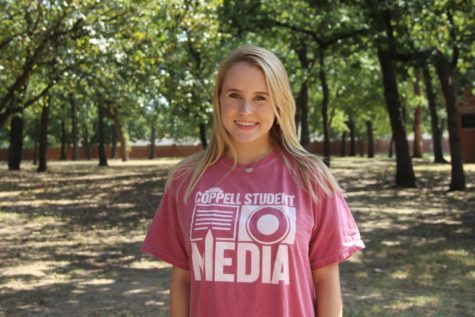
Amelia is a senior and has been a part of The Sidekick for two years. This year she is serving as the paper's Editor-In-Chief and Executive News Editor....
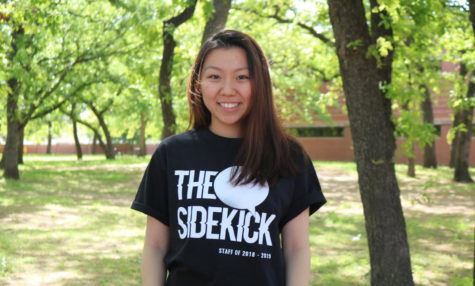
Kelly Wei is a senior staffer, serving her third year as Editor-in-Chief. In her free time, you can probably find her hiding out in a boba cafe with her...
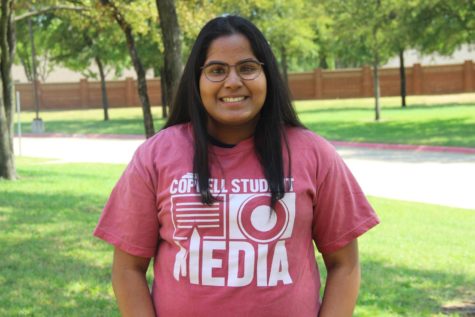
Karis Thomas is a senior and first year photographer for The Sidekick. In her free time, she enjoys spending time with friends and family, working on...



